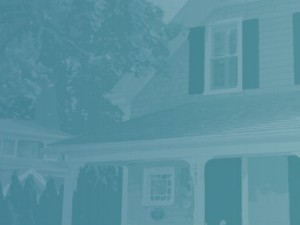Cape Cod needs bold and swift action to address the housing crisis. The Regional Housing Strategy, completed in May 2024, provides recommendations for addressing the housing supply, affordability, and availability challenges facing the region.
One of the key regional recommendations is establishing a housing land bank and a community land trust. These two potential new nonprofit entities would facilitate swifter acquisition, stewardship, development, and redevelopment of properties to advance attainable and affordable housing. To support implementation of this Regional Housing Strategy recommendation, the Cape Cod Commission worked with a consulting team led by Outwith Studio to develop a framework and recommendations for possible establishment of a community land trust and housing land bank on Cape Cod. Throughout this planning process, there were several opportunities for engagement to ensure the draft vision, mission, and structure of the potential entities reflects the needs of the Cape Cod community.
Recommendations
The final report provides recommendations for establishment, operations, mission, values, and funding options for the two entities. It also provides suggested names for the two entities as stakeholders were vocal about the need to adjust the terms to better fit the Cape Cod context. On Cape Cod, the phrase "land trust" and "land bank" have been largely associated with conservation-focused land trusts and land banks that previously or currently operate in the region. To distinguish these proposed housing-focused entities from the conservation organizations, the report recommends naming the entities to the Cape Cod Housing Trust and Cape Cod Housing Bank, and refers to them as such.
Cape Cod Housing Trust
Generally speaking, a community land trust is an organization that holds land in perpetuity for a values-driven purpose (often affordable housing or land conservation). This is often (but not always) a private independent nonprofit organization that is governed by people living on land trust property and members from the local community. In the classic community land trust model, the organization retains ownership of the land and sells the homes on that land to low-, moderate-, and middle-income households. The buyer signs a ground lease on the land that gives them full rights to use the land but ensures if the home is resold then the home is maintained as affordable.
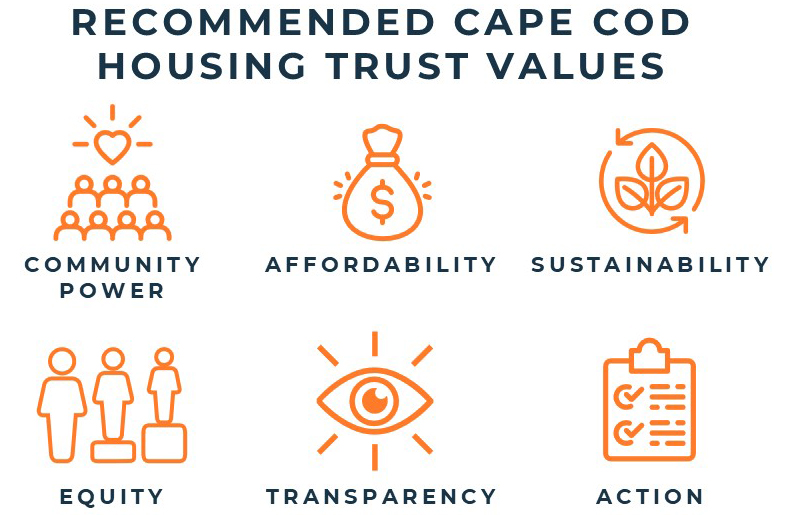 The report recommends the Cape Cod Housing Trust be rooted in six core values. It should work to prioritize the needs and well-being of Cape Cod residents through community power; providing permanently affordable and attainable housing solutions for individuals and families with a range of incomes; creating environmentally responsible and economically viable housing developments that contribute to the long-term health and vitality of Cape Cod communities and ecosystems; promoting fair and equitable access to housing opportunities for all, regardless of background; maintaining open and clear communication with stakeholders and the public, ensuring responsible governance and decision-making; and prioritizing incremental progress now over idealized progress in the future.
The report recommends the Cape Cod Housing Trust be rooted in six core values. It should work to prioritize the needs and well-being of Cape Cod residents through community power; providing permanently affordable and attainable housing solutions for individuals and families with a range of incomes; creating environmentally responsible and economically viable housing developments that contribute to the long-term health and vitality of Cape Cod communities and ecosystems; promoting fair and equitable access to housing opportunities for all, regardless of background; maintaining open and clear communication with stakeholders and the public, ensuring responsible governance and decision-making; and prioritizing incremental progress now over idealized progress in the future.
The Housing Trust should work to acquire existing housing and small scatter-site (re)development opportunities in already-developed areas and work to provide permanent affordable and attainable housing opportunities.
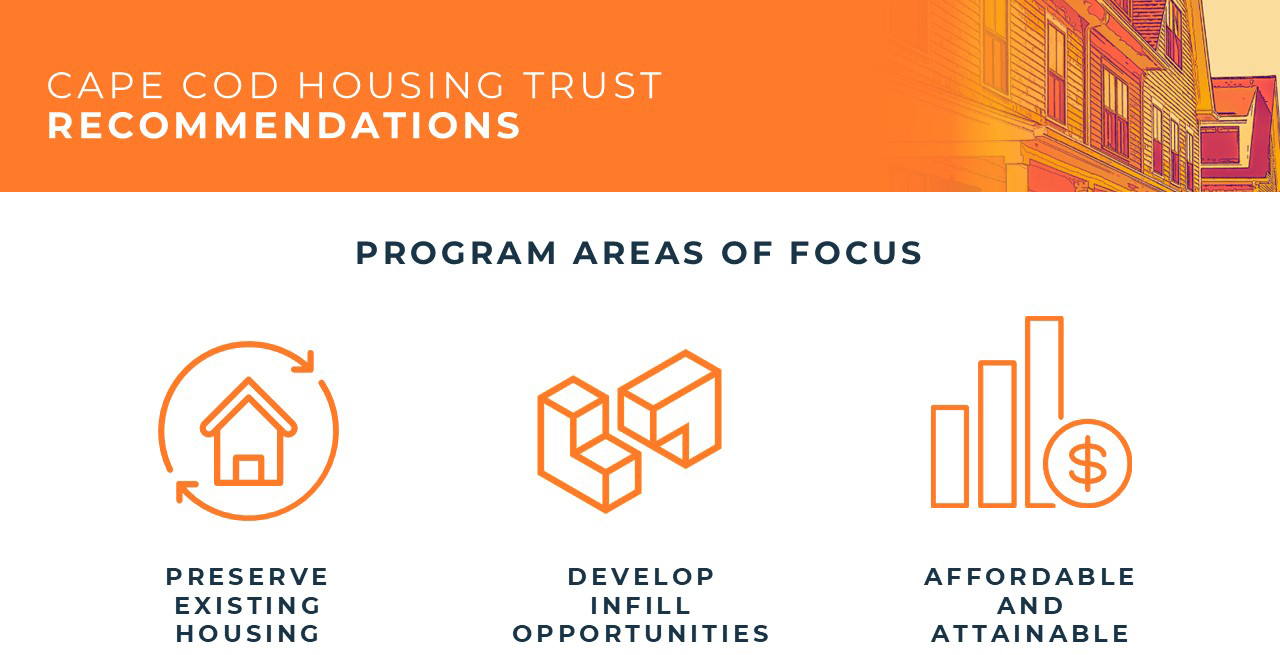
If the Cape Cod Housing Bank is established, the Housing Trust should work closely with that entity, particularly for property acquisition. The Housing Trust, as a private non-profit, would not have a dedicated public funding source but rather would need to fundraise through donors, grants, and potentially eventually through social impact investment.
Cape Cod Housing Bank
In its typical use, a land bank is an organization that buys and sells land over a short time span for a values-driven purpose (often economic development or land conservation). This is often (but not always) a public or quasi-public organization that is controlled by public officials and has dedicated public funding. Originated and popularized to combat urban disinvestment, land banks nationwide have been pivoting (or are being established) to create greater housing affordability.
The report recommends that the Cape Cod Housing Bank be established to focus on land acquisition for affordable and attainable housing, acquiring existing housing and redevelopment opportunities in already-developed areas. Once acquired, the Housing Bank should sell or donate that land to nonprofit housing entities for preservation or development of affordable and attainable housing. The scale of the project will determine the best project partner.
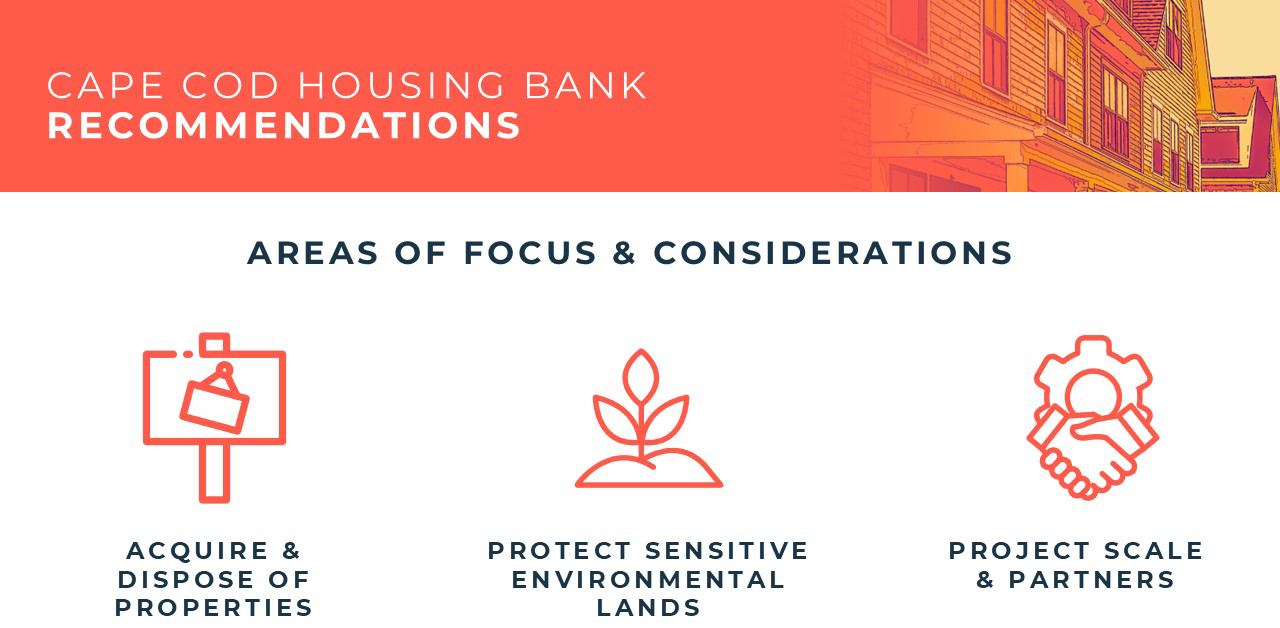
Additionally, the Housing Bank could help ready sites for development by undertaking provision of infrastructure, cleaning up brownfields, or similar activity. The Housing Bank should not undertake development itself. The report also recommends that the Housing Bank obtain at least one dedicated public funding source to capitalize and sustain its operations and provides some considerations for some existing or new potential funding sources.
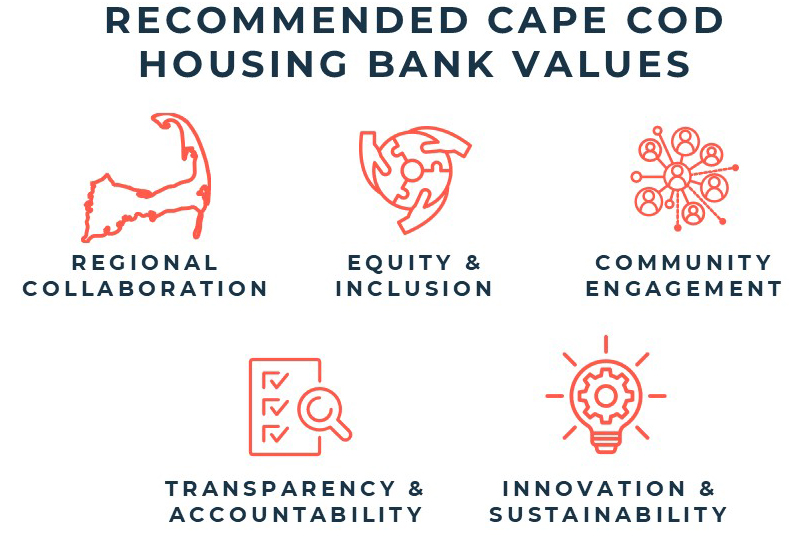 The report also recommends key values to guide the formation and operations of the Housing Bank. These include recognizing the interconnectedness of Cape Cod's housing challenges and prioritizing solutions that transcend local boundaries and working through regional collaboration; demonstrating a commitment to dismantling barriers to housing access and promoting diverse, equitable, and inclusive communities; prioritizing community engagement and involvement, which is essential to creating housing solutions that meet the unique needs of Cape Cod residents; operating in an open and transparent manner, and being accountable to the communities it serves; and embracing innovative approaches and sustainable practices that promote long-term housing affordability and environmental stewardship.
The report also recommends key values to guide the formation and operations of the Housing Bank. These include recognizing the interconnectedness of Cape Cod's housing challenges and prioritizing solutions that transcend local boundaries and working through regional collaboration; demonstrating a commitment to dismantling barriers to housing access and promoting diverse, equitable, and inclusive communities; prioritizing community engagement and involvement, which is essential to creating housing solutions that meet the unique needs of Cape Cod residents; operating in an open and transparent manner, and being accountable to the communities it serves; and embracing innovative approaches and sustainable practices that promote long-term housing affordability and environmental stewardship.
Next Steps
Moving establishment of either or both of these entities forward will require further stakeholder and community engagement. These entities, though different in structure and purpose, are both meant to be guided and driven by the community, its needs, and its vision and significant community buy-in will be key to their formation and their operational success.
Read the final report here, which provides greater detail on the formation and operations of the two potential entities.
Project Background
For more project and background information, view the slides and recording from the 2024 OneCape Summit session. You can also view the recordings from in-depth discussions, two focused on each entity, from late November and early December below.
Housing Land Bank In-depth Discussion, November 22, 2024
Community Land Trust In-depth Discussion, November 25, 2024
Housing Land Bank In-depth Discussion, December 10, 2024
Community Land Trust In-depth Discussion, December 11, 2024
If you would like to be engaged in the process or remain updated on this project, please reach out to Chloe Schaefer at chloe.schaefer@capecodcommission.org.
Contact
-
Chloe Schaeferchloe.schaefer@capecodcommission.org
-
Erin Perryeperry@capecodcommission.org
